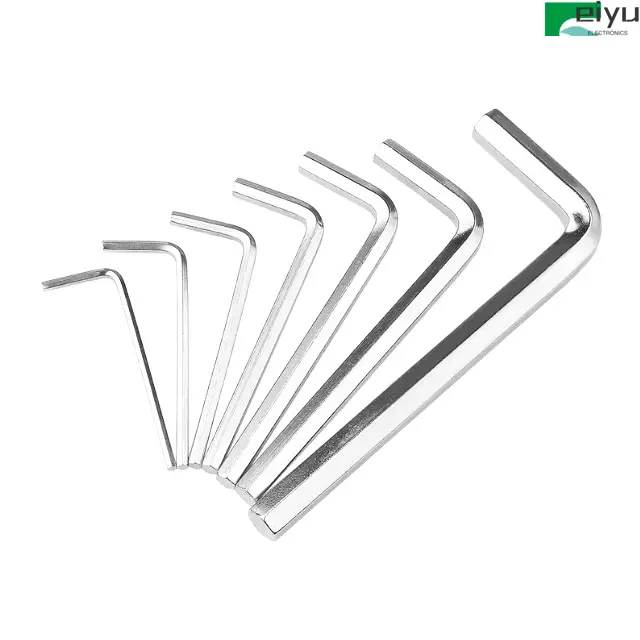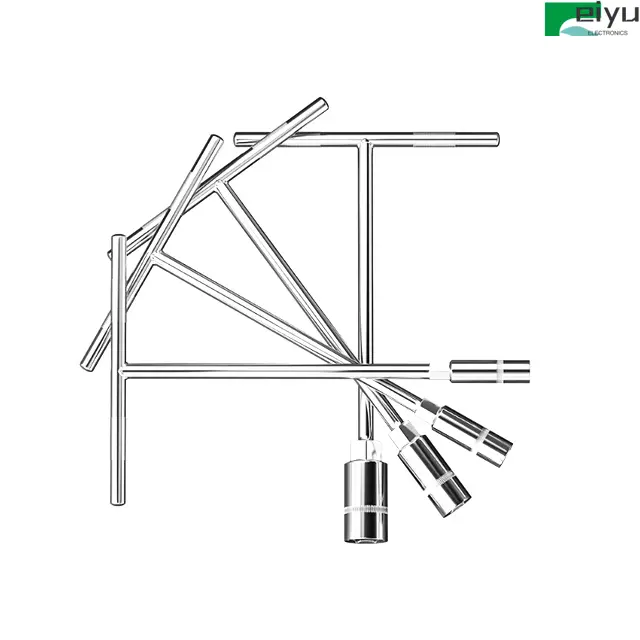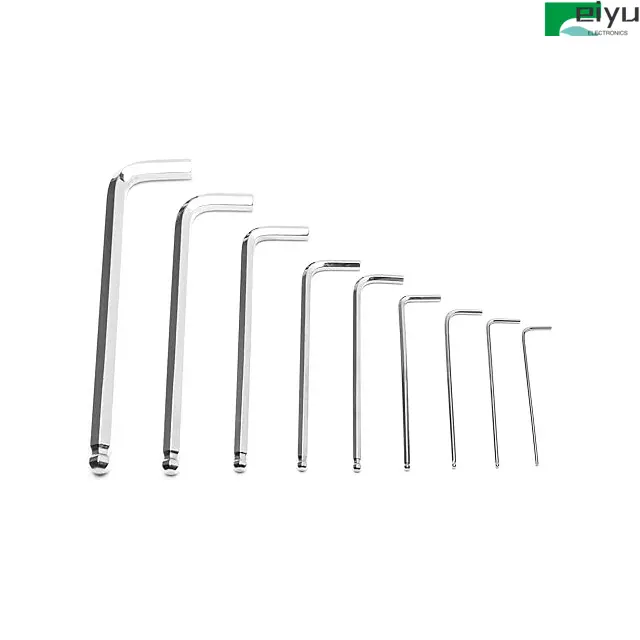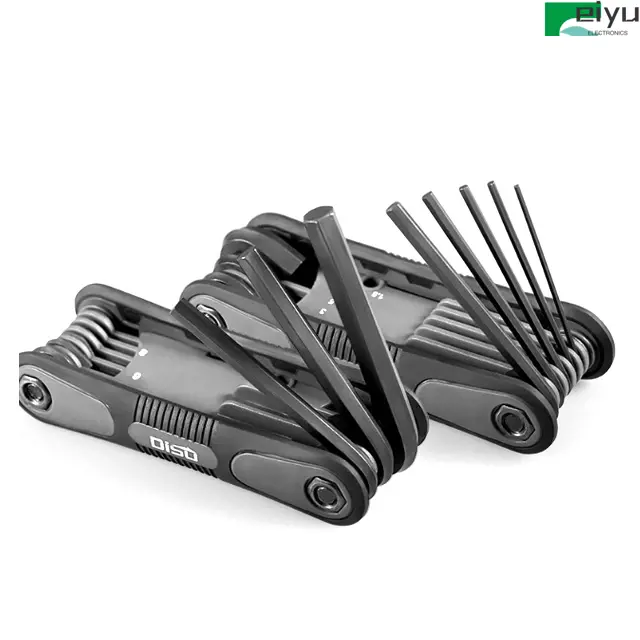Hex Keys Explained: The Complete User’s Guide
May 16, 2025
Uses and Functions of Hex Keys
● Aluminum
Hex keys are usually those small but essential tools used for hexagonal bolts and screws. Whether you’re fixing furniture or cars, they get the job done. This guide explains everything you need to know. Learn the types, uses, and care tips to make the most of your hex key set.
What are Hex Keys?

Hex keys are those small, L-shaped metal tools you typically find in toolkits for furniture and bike repairs. They’re designed for hex head screws and provide torque for tightening or loosening. Most hex keys are made from steel and come in metric or imperial (SAE) sizes. You might also hear them call it an Allen wrench, but they’re the same tool.
Their simple shape makes them easy to use. You’ll also notice that the short end fits bolts in small areas. Its longer end gives you better reach and control when turning. Hex keys are versatile all-rounders that come in handy whenever you need to build or repair.
Uses and Functions of Hex Keys
It’s the usual SOP for flat-pack manufacturers to include Allen keys in their products. Hex keys are very useful when assembling DIY decor and furniture. This is commonly the classic L-shaped one since it’s a practical solution to most lightweight purposes. Bookshelves, coffee tables, bedside cabinets, and most home repairs can easily be fixed using an L-shaped hex key.
Hex keys are also incredibly useful for industrial uses such as automobiles, construction, and plumbing. Cars, trucks, motorcycles, or any type of vehicle needs brakes, filters, and numerous parts secured in place. And with the various hex key sizes available, it’s easier to fit them. Any mechanic sure has some hex keys in their toolbox ready to deliver performance as needed.
Allen wrenches also play a crucial role in construction. Builders can reach into tight spaces and secure connections with the help of a hex key. Plus, it's easy to carry around while on-site. Even in big infrastructure projects, heavy-duty hex keys are the standard for fasteners that require an immense amount of torque.
Connecting pipes is also made easy when you have hex keys in your toolbox. The bigger the pipe, the bigger the Allen key. Its wide range of sizes just makes plumbing less complicated. You won’t have to spend ridiculous time loosening or tightening connections and making repairs.
Types of Hex Keys
There are numerous types of hex keys you’ll find in the market today. But which one suits your preferences best? Here are some of the most common options you can choose from.
L-Shaped Hex Keys

You’ll find different types of hex keys based on shape, size, and function. The most common type is the standard L-shaped ones that come in either short or long arms. They’re simple, crazy portable, and perfect for everyday tasks. You’ll likely receive these with your new flat-pack furniture or small mechanical parts.
T-Handle Hex Keys

Another option is the T-handle hex key, which offers better grip and torque. If you need comfort during extended use, try this style. Instead of having the short end of the key, it’s replaced with a handle, making it look like a typical screwdriver. And with the handle already available, it’s an excellent choice for professionals who need to frequently use Allen keys.
The design itself is well-thought, with the handle allowing the hex key itself to fit in the screw head easier. Your force is evenly spread out, allowing you to turn it effortlessly. However, unlike its classic counterpart, T-handle hex keys are limited to use with a lot of clearance. They’re longer and bulkier, making them a no-go for jobs involving small spaces.
But if you’re assembling your DIY table or fixing a car, you’ll love how convenient a T-handle hex key is. Now, of course, they’re pricier than conventional L-shaped hex keys. But it might just be your best investment if you're a professional who works with automobiles, electronics, or repairs. You’ll get the best value if you’re someone who uses hex keys all day, every day.
Ball-End Hex Keys

Ball-end hex keys offer valuable versatility you won’t experience from L-shaped or T-handle options. The first two we discussed above require the screw to sit at a right angle to slide into the socket. Now, if you’re working with complicated engineering, a ball-end hex key is your best choice. It has the classic L-shape and a hex key on the short end, and a ball key on the longer end.
Its ball end can tighten and loosen screws with an offset of up to 30o. If there’s very limited clearance paired with an angled screw, you won't have trouble freeing it using a ball end hex key. On the other hand, it’s not the best for tightening purposes where you need a great amount of force. And if you don’t use it properly, you might just end up stripping the screw socket.
Folding Hex Key Set

Here’s the most portable hex key you can bring and use anytime, anywhere. A folding hex key set features various hex key sizes in one keychain-sized housing. Imagine a Swiss-Army knife, but you get at least 8 hex keys instead of survival tools. If you’re looking for a hex key set you can fit in your pocket, you’ll love this design.
But here’s the kicker. They are serviceable for light purposes like bike repairs and general home use. It also comes at a very affordable price. However, you can’t count on foldable hex keys to deliver the same durability and reliability that a proper set would.
The attachment point where the tool is connected to its housing is also usually a weak point. They tend to break when you apply too much force when turning. But for a casual tightening of that door screw or replacing that rusty screw in your coffee table? A foldable hex key set is a practical solution.
Materials
Another factor to consider is the materials used in making the hex keys. Depending on your purpose and budget range, having the right hex keys can make your job a lot easier. You can cut down your estimated time to finish a project just by having the right equipment at hand. Here are some of the most common materials manufacturers use to make hex keys.
Chrome Vanadium Steel
Offering the best durability for hex keys, Cr-V is one of the toughest materials, offering an impressive amount of torque. If you’re working with heavy equipment, rest assured that tools made with CR-V offer a hardness you can depend on. Guarantee safety when you can tighten and secure screws without worrying if your Allen key will snap.
Composition:
● 0.5% Carbon
● 0.8% Manganese
● 0.2% Silicon
● 1.0% Chromium
● >0.15% Vanadium
Chrome Molybdenum Steel
Another heavy-duty metal, Cr-Mo steel, is what most hex keys in the US are made of. Packed with toughness and excellent ability to take impact, chrome molybdenum steel is a dependable standard material. It possesses better durability than Cr-V, so you can expect easier use and a longer lifespan. Again, for purposes that require you to go full force when turning, Cr-Mo hex keys are your best bet.
Composition:
● 0.5% Carbon
● 0.88% Manganese
● 0.2% Molybdenum
● 0.5% Chromium
● 0.55% Nickel
S2 Silicon Alloy Steel
If you’re looking for a premium hex key set, get one that’s made using S2. With unbeatable hardness, water- and impact-resistance, it’s the best material for tools that need to withstand a great amount of force. Rest assured that your hex key set will serve you for ages, even with constant heavy use. You can unscrew even the impossible (or so it seems) when you have an S2 hex key at hand.
Composition:
● 0.5% Carbon
● 0.5% Molybdenum
● 1.0% Silicon
● 0.5% Manganese
● 0.4% Vanadium
Alloy Steel
Alloy steel is a very versatile material with a variety of uses for numerous industries. When it comes to hex keys, it’s usually a combination of carbon mixed with another metal like stainless steel. With its availability and reasonable price, many manufacturers play with it to accommodate specific features like hardness or rust-resistance. It’s durable and affordable without compromising quality.
Carbon Steel
Carbon steel has made a name for itself as a tough material, especially in the automotive industry. Even some companies rely on carbon steel pipelines to deliver their product safely. But when it’s turned into a hex key or other tools? It can face immense temperatures and pressure without buckling.
Stainless Steel
As its name suggests, anything stainless steel is equipped with high stain- and corrosion-resistance. Plus, it’s also on the more affordable end, making them a great option if you’re on a budget. You can count on its durability and depend on its performance for most general use. Bike repairs, electronics, and home DIYS are all good, but if it’s heavy engineering, this might not be good enough.
Aluminum
Here’s a lightweight alternative that works well if you’re dealing with electronics. Aluminum can conduct electricity, is lightweight, and can resist corrosion well. Hex keys made with this material are also one of the cheapest in the market. They’re good for light jobs, but don’t depend on aluminum hex keys to survive heavy usage where intense torque is needed.
Hex Key Sizes
Identifying hex key sizes can be a pain. Different brands, country of origin, and store location can determine whether you need to use the SAE or metric sizing. To help you determine which hex key sizes you need, here’s a comprehensive look.
|
SHORT ARM SAE HEX KEY SIZES |
|||
|
Hex Key Size |
Width Across Flats |
Length of Short Arm |
Length of Long Arm |
|
0.028" |
0.0275" - 0.028" |
0.219" |
1.219" |
|
0.035" |
0.0345" - 0.035" |
0.344" |
1.219" |
|
0.050" |
0.049" - 0.050" |
0.531" |
1.656" |
|
1/16" |
0.0615" - 0.0625" |
0.562" |
1.75" |
|
5/64" |
0.0771" - 0.0781" |
0.609" |
1.875" |
|
3/32" |
0.0927" - 0.0937" |
0.656" |
2" |
|
7/64" |
0.1077" - 0.1093" |
0.703" |
2.125" |
|
1/8" |
0.1235" - 0.1250" |
0.75" |
2.25" |
|
9/64" |
0.1391 - 0.1406" |
0.796" |
2.375" |
|
5/32" |
0.1547" - 0.1562" |
0.844" |
2.5" |
|
3/16" |
0.1860" - 0.1875" |
0.938" |
2.75" |
|
7/32" |
0.2172" - 0.2187" |
1.031" |
3" |
|
1/4" |
0.248 - 0.250" |
1.125" |
3.25" |
|
5/16" |
0.3110" - 0.3125" |
1.25" |
3.75" |
|
3/8" |
0.373" - 0.375" |
1.375" |
4.25" |
|
7/16" |
0.4355" - 0.4375" |
1.5" |
4.75" |
|
1/2" |
0.04975" - 0.50" |
1.625" |
5.25" |
|
9/16" |
0.56" - 0.5625" |
1.75" |
5.75" |
|
5/8" |
0.6225" - 0.625" |
1.875" |
6.25" |
|
3/4" |
0.747" - 0.75" |
2.125" |
7.25" |
|
7/8" |
0.872" - 0.875" |
2.375" |
8.25" |
|
1" |
0.049" - 0.050" |
0.531" |
1.656" |
|
LONG ARM SAE HEX KEY SIZES |
|||
|
Hex Key Size |
Width Across Flats |
Length of Short Arm |
Length of Long Arm |
|
0.050" |
0.049" - 0.050" |
0.531" |
2.844" |
|
1/16" |
0.0615" - 0.0625" |
0.562" |
3" |
|
5/64" |
0.0771" - 0.0781" |
0.609" |
3.188" |
|
3/32" |
0.0927" - 0.0937" |
0.656" |
3.375" |
|
7/64" |
0.1077" - 0.1093" |
0.703" |
3.562" |
|
1/8" |
0.1235" - 0.1250" |
0.75" |
3.75" |
|
9/64" |
0.1391" - 0.1406" |
0.796" |
3.937" |
|
5/32" |
0.1547" - 0.1562" |
0.844" |
4.125" |
|
3/16" |
0.1860" - 0.1875" |
0.938" |
4.5" |
|
7/32" |
0.2172" - 0.2187" |
1.031" |
4.875" |
|
1/4" |
0.248" - 0.250" |
1.125" |
5.25" |
|
5/16" |
0.3110" - 0.3125" |
1.25" |
6" |
|
3/8" |
0.373" - 0.375" |
1.375" |
6.75" |
|
7/16" |
0.4355" - 0.4375" |
1.5" |
7.5" |
|
1/2" |
0.04975" - 0.50" |
1.625" |
8.25" |
|
9/16" |
0.56" - 0.5625" |
1.75" |
9" |
|
5/8" |
0.6225" - 0.625" |
1.875" |
9.75" |
|
3/4" |
0.747" - 0.75" |
2.125" |
11.25" |
|
7/8" |
0.872" - 0.875" |
2.375" |
12.75" |
|
1" |
0.049" - 0.050" |
0.531" |
14.25" |
|
SHORT ARM METRIC HEX KEY SIZES |
|||
|
Hex Key Size |
Width Across Flats |
Length of Short Arm |
Length of Long Arm |
|
0.9 |
0.876 - 0.899 |
6 - 11 |
28 - 34 |
|
1.3 |
1.244 - 1.270 |
11 - 16 |
39 - 44 |
|
1.5 |
1.47 - 1.5 |
13 - 14 |
43 - 45 |
|
2 |
1.97 - 2.00 |
15 - 16 |
48 - 50 |
|
2.5 |
2.47 - 2.50 |
17 - 18 |
53 - 56 |
|
3 |
2.96 - 3.00 |
18 - 20 |
60 - 63 |
|
4 |
3.96 - 4.00 |
23 - 25 |
66 - 70 |
|
5 |
4.96 - 5.00 |
26 - 28 |
76 - 80 |
|
6 |
5.95 - 6.00 |
30 - 32 |
86 - 90 |
|
8 |
7.95 - 8.00 |
34 - 26 |
95 - 100 |
|
10 |
9.95 - 10.00 |
38 - 40 |
106 - 112 |
|
12 |
11.95 - 12.00 |
43 - 45 |
119 - 125 |
|
14 |
13.95 - 14.00 |
53 - 56 |
133 - 140 |
|
17 |
16.93 - 17.00 |
60 - 63 |
152 - 160 |
|
19 |
18.93 - 19.00 |
67 - 70 |
271 - 280 |
|
LONG ARM METRIC HEX KEY SIZES |
|||
|
Hex Key Size |
Width Across Flats |
Length of Short Arm |
Length of Long Arm |
|
1.5 |
1.47 - 1.5 |
13 - 14 |
76 - 78 |
|
2 |
1.97 - 2.00 |
15 - 16 |
81 - 83 |
|
2.5 |
2.47 - 2.50 |
17 - 18 |
87 - 90 |
|
3 |
2.96 - 3.00 |
18 - 20 |
97 - 100 |
|
4 |
3.96 - 4.00 |
23 - 25 |
102 - 106 |
|
5 |
4.96 - 5.00 |
26 - 28 |
114 - 118 |
|
6 |
5.95 - 6.00 |
30 - 32 |
136 - 140 |
|
7 |
6.97 - 7.00 |
34 - 36 |
140 - 145 |
|
8 |
7.95 - 8.00 |
34 - 36 |
155 - 160 |
|
10 |
9.95 - 10.00 |
38 - 40 |
164 - 170 |
|
CONVERSION TABLE |
|||
|
SAE to Metric |
Metric to SAE |
||
|
5/64" |
2mm |
2mm |
3/32" |
|
3/32" |
2.5mm |
2.5mm |
7/64" |
|
7/64" |
3mm |
3mm |
1/8" |
|
1/8" |
3.5mm |
3.5mm |
9/64" |
|
5/32" |
4mm |
4mm |
5/32" |
|
3/16" |
5mm |
5.5mm |
7/32" |
|
7/32" |
5.5mm/6mm |
6mm |
1/4" |
|
1/4" |
7mm |
7mm |
9/32" |
|
5/16" |
8mm |
8mm |
5/16" |
|
3/8" |
10mm |
9mm |
3/8" |
Hex Keys vs. Allen Wrench
There’s a fog that confuses newbies who are not yet familiar with these tools. They may be talking to one person who mentions hex keys, while another says “Allen wrench”. So, what exactly is the difference between a hex key and an Allen wrench?
Hex keys are the universal term for the tool, while “Allen” is actually a brand offering hex keys. They all serve the same function, sizes, and purpose. The price and quality varies per brand/manufacturer. But both hex keys and Allen wrench offer a six-sided key that can tighten or unscrew a hexagonal socket.
How to Maintain Hex Keys
Firstly, make sure that you use the proper hex key size for any project. Using the wrong one will damage both the screw socket and your tool. Secondly, get a hex key set that’s easy and comfortable to use. It will allow you to apply force as needed and work for extended hours without discomfort.
Now, wipe your hex keys clean after using them. And yes, it’s easier to just toss them in your toolbox along with everything else. But keeping them in their proper case away from moisture and exposure will help extend their lifespan. Keep away from corrosion and damage when you store your hex key set in its protective case.
Hex keys are reliable, simple, and useful for countless tasks. Now you know how to use, choose, and maintain them. Keep your set handy and in good shape. With the right keys, you’re always ready to tackle repairs, builds, or adjustments with ease and confidence!
FAQs
Are hex keys universal?
Yes. The key’s six-sided design itself is universal, and they only vary in sizes. You’ll find that most manufacturers of hex keys have the same product, just differ in quality, price and brand name.
What’s the best material for hex keys?
Alloy steel and titanium are the go-to materials for many. But if you want superior durability that can endure intense torque, get a set that’s made from S2 silicon alloy steel.
What can I use instead of a hex key?
It’s not recommended to substitute anything for hex keys unless it’s necessary since it can strip the screw head. But if you’re in a desperate position, you can grab a flathead screwdriver, a Torx key, or even a pencil. Torx and flathead screwdrivers can fit on the socket and offer enough grip so you can free the screw. You can shave the tip of a pencil to mimic the shape of a hex key.
Предыдущая статья CR2032 Battery: The Tiny Powerhouse for Your Everyday Tech


